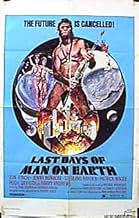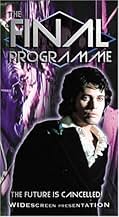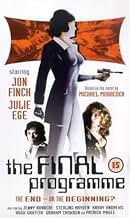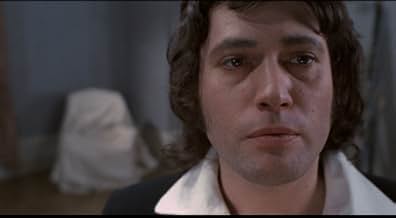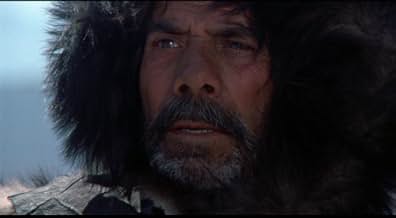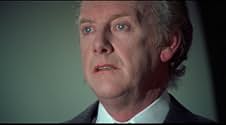IMDb RATING
5.4/10
1.2K
YOUR RATING
A trio of scientists plan to create a self-replicating, immortal, hermaphrodite using the Final Programme developed by a dead, Nobel Prize-winning scientist.A trio of scientists plan to create a self-replicating, immortal, hermaphrodite using the Final Programme developed by a dead, Nobel Prize-winning scientist.A trio of scientists plan to create a self-replicating, immortal, hermaphrodite using the Final Programme developed by a dead, Nobel Prize-winning scientist.
- Awards
- 1 win & 1 nomination total
Sandy Ratcliff
- Jenny
- (as Sandy Ratcliffe)
Mary MacLeod
- Nurse
- (as Mary Macleod)
Delores Delmar
- Fortune Teller
- (as Dolores Del Mar)
- Director
- Writers
- All cast & crew
- Production, box office & more at IMDbPro
Featured reviews
I first saw this film when it came out in 1973, and just watched it for the second time on DVD. Excellent production values and camera work. Stars Jon Finch as androgynous (but heterosexual) dandy-dressing Jerry Cornelius, with black nail polish; looks a bit like a cross between an older Johnny Depp and Billy Zane. Also stars Sterling Hayden, Julie Ege and the evil (duh) Nazi guy from "Raiders of the Lost Ark". The film itself is a cult science fiction fantasy in the best tradition of the late '60's - early '70's, with similarities in style to The Prisoner, early James Bond (slightly), Clockwork Orange, The Abominable Dr. Phibes, and The Avengers (the director worked on the last two of those also). It is years ahead of its time in theme and science, but lapses into camp several times, especially as it progresses. It is rather disjointed, but the acting and sets are both good. Based on a story by Michael Moorcock.
An ambiguous adventurer becomes involved with an experiment designed to overcome the impending extinction of the human species. One from the "What were they thinking?!" school of film-making: much like John Boorman's contemporaneous ZARDOZ (1974), this is yet another good-looking but uncontrolled attempt at a 'trippy' post-apocalyptic scenario that ends up being embarrassingly campy – and, here, wasting a fine veteran cast (Sterling Hayden, Patrick Magee, George Coulouris, Harry Andrews and Hugh Griffith) into the bargain – none of whom appear in any scenes together. The main role of Jerry Cornelius had been offered to Mick Jagger (who rejected the script as "too weird"!) and Timothy Dalton before Jon Finch stepped in and basically stopped his promising film career dead in its tracks; in hindsight, it is understandable not only that novelist Michael Moorcock hated this adaptation but also that his prolific literary creation never returned in any further cinematic adventure since! For the record, the supporting cast also features Jenny Runacre (as Cornelius' supremely annoying androgynous acolyte), Graham Crowden, Ronald Lacey, Sarah Douglas and Julie Ege...but every earnest effort on anybody's part is stifled by the film's relentless visual and aural assault on the viewers' senses. Interestingly, the former is reminiscent of A CLOCKWORK ORANGE (1971) and the latter features Eric Clapton among the session musicians! When Roger Corman picked up the film for U.S. distribution, he not only trimmed it by 11 minutes but also retitled it as LAST DAYS OF MAN ON EARTH to (reportedly) little effect.
The early-to-mid '70's saw a glut of movies predicting a pessimistic future for Mankind; 'Soylent Green', 'No Blade Of Grass', 'A Clockwork Orange', 'Logan's Run', the 'Planet Of The Apes' sequels and this, based on a Michael Moorcock novel. Jon Finch stars as Jerry Cornelius, Nobel Prize winner, rock star and secret agent, who embarks on a quest to free his beloved sister from the clutches of his evil brother Frank. The world Cornelius inhabits is the Swinging Sixties writ large; recreational drug use, rampant sexual promiscuity, and lack of respect for authority are rife. Writer, set designer and director Robert Fuest had worked on the 'Avengers' television series, and it shows. The sets are dazzling, the supporting cast good, and despite its pessimistic theme the film manages to be fun. Jenny Runacre steals the show as the bizarre 'Miss Brunner', a freakish mutation who absorbs the bodies of her lovers. You really need to watch this to believe it. Funny, stylish and erotic, its a genuine cult oddity.
Very stylish tongue-in-cheek sci-fi. I don't recall it being a midnight movie in the 70s or 80s, though it should have been a cult classic here in the U.S.
After watching it for the first time last night, I can understand why it didn't see much action on American TV: it is permeated with drug use, irreverence toward religion, nudity, and generally perverse attitudes. As noted by others, it is in the style-sphere of "Modesty Blaise" and "The Avengers" (for which director Fuest wrote and directed in the Linda Thorson and Joanne Lumley eras.) The movie looks great, especially considering the small budget.
As a computer programmer, I took it as a nice joke that the computer is depicted as a realistically nondescript box, rather than the usual sci-fi flashing-light monstrosity.
Jon Finch seems like a lost member of Led Zeppelin, charismatic, offhand and saturnine. Jenny Runacre plays the imperious Miss Brunner (a nod to SF writer John Brunner?) with a lot of relish.
Nice to see two Kubrick actors here: Sterling Hayden (Gen. Jack Ripper in "Dr. Strangelove") and Patrick Magee from "Clockwork Orange". Also, George Coulouris from "Citizen Kane" and a young Sarah Douglas, who later played one of the Kryptonian criminals in the "Superman" series.
On the DVD commentary, it is mentioned that Eric Clapton performed the blues guitar on the soundtrack. He is not credited, but the two composers for the film, Beaver and Krause, share music credits with Cream on a 1970 picture, "Pacific Vibrations". So it seems plausible, and I wonder if the solo drum portion of the soundtrack might then be Ginger Baker? Jazz baritone saxist Gerry Mulligan's contribution is wonderful. The diverse music is a strong point of the film.
The ending didn't really pay off for me. Maybe it was intended to be a sly nod to "2001"; maybe they just needed to wind things up. But I found the movie very worth seeing.
After watching it for the first time last night, I can understand why it didn't see much action on American TV: it is permeated with drug use, irreverence toward religion, nudity, and generally perverse attitudes. As noted by others, it is in the style-sphere of "Modesty Blaise" and "The Avengers" (for which director Fuest wrote and directed in the Linda Thorson and Joanne Lumley eras.) The movie looks great, especially considering the small budget.
As a computer programmer, I took it as a nice joke that the computer is depicted as a realistically nondescript box, rather than the usual sci-fi flashing-light monstrosity.
Jon Finch seems like a lost member of Led Zeppelin, charismatic, offhand and saturnine. Jenny Runacre plays the imperious Miss Brunner (a nod to SF writer John Brunner?) with a lot of relish.
Nice to see two Kubrick actors here: Sterling Hayden (Gen. Jack Ripper in "Dr. Strangelove") and Patrick Magee from "Clockwork Orange". Also, George Coulouris from "Citizen Kane" and a young Sarah Douglas, who later played one of the Kryptonian criminals in the "Superman" series.
On the DVD commentary, it is mentioned that Eric Clapton performed the blues guitar on the soundtrack. He is not credited, but the two composers for the film, Beaver and Krause, share music credits with Cream on a 1970 picture, "Pacific Vibrations". So it seems plausible, and I wonder if the solo drum portion of the soundtrack might then be Ginger Baker? Jazz baritone saxist Gerry Mulligan's contribution is wonderful. The diverse music is a strong point of the film.
The ending didn't really pay off for me. Maybe it was intended to be a sly nod to "2001"; maybe they just needed to wind things up. But I found the movie very worth seeing.
The novel from which this movie was taken, The Final Programme, by Michael Moorcock, is structurally identical in plot and character to another Moorcock novel... Elric of Melnibone, the first of the Elric series.
This is not a coincidence; both books are part of the Champion Eternal cycle... a series of interconnected series about the Champion Eternal, who exists in every time and every universe, condemned always to fight -- and never know why he is fighting. He goes by many names -- Elric of Melnibone, Jerry Cornelius, Count Urlik, Prince Corum, each with his own series. In some incarnations he knows who he is, in others he thinks he's a normal man (occasionally, a particular incarnation is female). Sometimes two (or even three) incarnations meet each other.
The cycle, which makes up about a third of all Moorcock's ouevre (probably dozens of novels), is one of the most monumental achievements of meta-fiction ever written... but I think this is the only book of Moorcock's made into a movie, though he did contribute to the adaptation of the Edgar Rice Burroughs novel The Land That Time Forgot (dinosaurs on an island).
Now that Fritz Leiber is dead, Moorcock can lay claim to being the greatest living fantasy writer.
The movie The Final Programme (a.k.a. The Last Days of Man On Earth) does an incredible job of capturing the Jerry Cornelius character, much better than I would have expected. But the ending is changed from that of the book, and not for the better. Still definitely worth a rental.
Dafydd ab Hugh
This is not a coincidence; both books are part of the Champion Eternal cycle... a series of interconnected series about the Champion Eternal, who exists in every time and every universe, condemned always to fight -- and never know why he is fighting. He goes by many names -- Elric of Melnibone, Jerry Cornelius, Count Urlik, Prince Corum, each with his own series. In some incarnations he knows who he is, in others he thinks he's a normal man (occasionally, a particular incarnation is female). Sometimes two (or even three) incarnations meet each other.
The cycle, which makes up about a third of all Moorcock's ouevre (probably dozens of novels), is one of the most monumental achievements of meta-fiction ever written... but I think this is the only book of Moorcock's made into a movie, though he did contribute to the adaptation of the Edgar Rice Burroughs novel The Land That Time Forgot (dinosaurs on an island).
Now that Fritz Leiber is dead, Moorcock can lay claim to being the greatest living fantasy writer.
The movie The Final Programme (a.k.a. The Last Days of Man On Earth) does an incredible job of capturing the Jerry Cornelius character, much better than I would have expected. But the ending is changed from that of the book, and not for the better. Still definitely worth a rental.
Dafydd ab Hugh
Did you know
- TriviaA few years after making this film, Sterling Hayden was interviewed for a British magazine and insisted that Robert Fuest was his favorite director, the best he had ever worked with. As Hayden has only one scene in this film, and almost certainly took no longer than a couple of days to film it, perhaps less, and as he also spoke in the same interview about his work with Stanley Kubrick, John Huston, Bernardo Bertolucci, Robert Altman and Nicholas Ray, it may be that he was being sarcastic.
- Quotes
Nurse: It's much easier to run a hospital with all the patients sleeping.
Jerry Cornelius: Easiest way to run the world, for that matter.
- ConnectionsFeatured in Nightmare Theatre's Late Night Chill-o-Rama Horror Show Vol. 1 (1996)
- How long is The Final Programme?Powered by Alexa
Details
- Release date
- Country of origin
- Language
- Also known as
- The Last Days of Man on Earth
- Filming locations
- Production companies
- See more company credits at IMDbPro
Contribute to this page
Suggest an edit or add missing content

